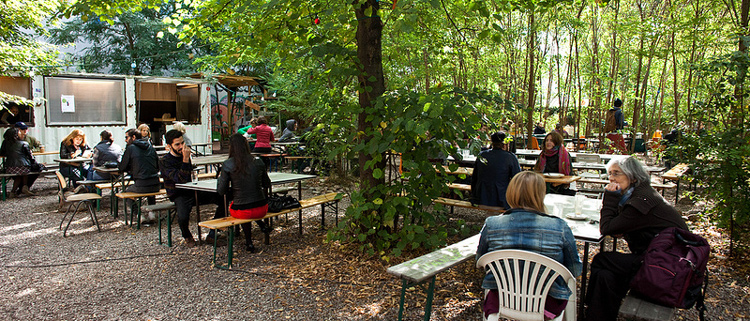
Civic greening
First we fix the gardens, then we take Berlin
How community gardens help increase awareness about urban ecology
One concern about increasing urbanization and reduced access to green areas, is that it creates a sort of generational amnesia about people's relationships to, and dependence upon, ecosystems.
In a recently published article in Landscape and Urban Planning, Pim Bendt from the Beijer Institute of Ecological Economics along with centre researchers Stephan Barthel and Johan Colding, have looked at how community gardens in Berlin can help teach communities the importance of urban ecosystems and green areas.
What they found was that areas that intertwine gardening with social, political and economic practices can boost learning about the interdependencies between humans and nature, and help develop a sense-of-place in degraded neighbourhoods.
Request publication
The gardens
Through geographical mapping and in-depth interviews, Barthel and his colleagues selected four community gardens in Berlin that would serve as appropriate case studies:
Prinzessinnengarten, a popular garden run by a social enterprise called "nomadische grün" (Nomadic Green). The land is rented from the state of Berlin.
Lichtenrader Volkspark, a park area founded in 1981 after local residents had struggled to secure a green space in the local area. The area has grown to encompass 30,000 square meter and hosts an annual harvest festival.
The Rosa Rose Garten, a garden illegally developed in 2004 on private property. Despite becoming a popular area for cultural activities, the garden has twice been forced to move. Discussions with the city of Berlin is ongoing to remain on the land it currently occupies.
Bürgergarten Laskerwiese, an area comprising 35 garden plots gardened individually. The area also include an open leisure park, composts, a pond, and habitats for insects and small mammals.
The flowers, the politics and the neighbours
Through interviews with community members involved in the gardens, the researchers could analyse their perceptions of gardening practices and community dynamics as well as the communities' interactions with local authorities.
"We found that the gardens constitute learning environments that engages individuals in the community and provide them with an increased understanding of local ecological conditions such as soil quality," says co-author Stephan Barthel.
As one participant put it: "You may know how to grow tomatoes ... but you have to also know the particularities of the ground, so the other members told me, it is really poor ground don´t try this or don´t try that."
Twists and turns
But all gardens are not metaphorical rose gardens for community-based collaboration. Ironically, the Rosa Rose garden exemplifies this. Since the garden was erected illegally, it immersed itself—quite literally—in the politic sphere. The twists and turns of this story include activist actions, solidarity events, media-spurs, extensive negotiations with the municipality, a failed attempt to buy the land, police evictions and even law-suits.
This struggle has helped the Rosa Rose Garten community to understand the dynamics between actors from government, private sector and civil society in the area.
As one community member said:
"... [Before] I never had a clue ... about what's happening around me in the neighbourhood, who has got power and how, (...) this helps me also more to think how to intervene and how to be active in this ..."
Those everyday practices
Irrespective of the challenges and opportunities, Barthel and his colleagues make it clear that sustainable urban growth in such cities cannot rely upon governments and experts alone.
"Greening urban areas must also spring from below, through active participation and experimentation by the citizens themselves. From this perspective the sustainable city does not weave nature only into its physical landscape, but into the everyday practices and experiences of its citizens as well," lead author Pim Bendt concludes.
Request publication
See video with Marianne Krasny from Cornell University explaining how cities can be arenas for learning about ecosystems:
References
Bendt, P. Barthel, S. and Colding, J. (2012). Civic greening and environmental learning in public-access community gardens in Berlin. Landscape and Urban planning. Online here
Pim Bendt works with beekeeping at Bee Urban, which provides companies and public agencies with ecosystem-enhancing services. He previously worked with the Tällberg Foundation and the Beijer Institute of Ecological Economics where his research focused on social features of ecosystem management in cities.
Stephan Barthel's research revolves around aspects in relation to management of urban ecosystem services and resilience. Focus is on social as well as ecological features that influence management practices.
Johan Colding's research areas and interests include biodiversity conservation, ecosystem management, institutional analyses and social-ecological system interactions, as well as urban ecosystem management with a focus on urban design and resilience building.
Visiting address: Albanovägen 28. Disability entrance: Albanovägen 18
Deliveries: Roslagsvägen 28
Postal address (courier packages):
Stockholms Universitet
Stockholm Resilience Center
[Recipient]
Frescativägen 8
114 18 Stockholm
Sweden
Postal address (letters):
Stockholms Universitet
Stockholm Resilience Center
[Recipient]
Frescativägen 8
SE-106 91 Stockholm
Sweden
Phone: +46 8 674 70 70
Organisation number: 202100-3062
VAT No: SE202100306201






